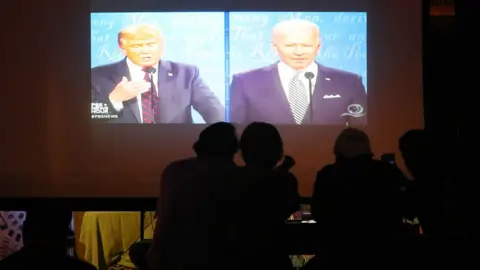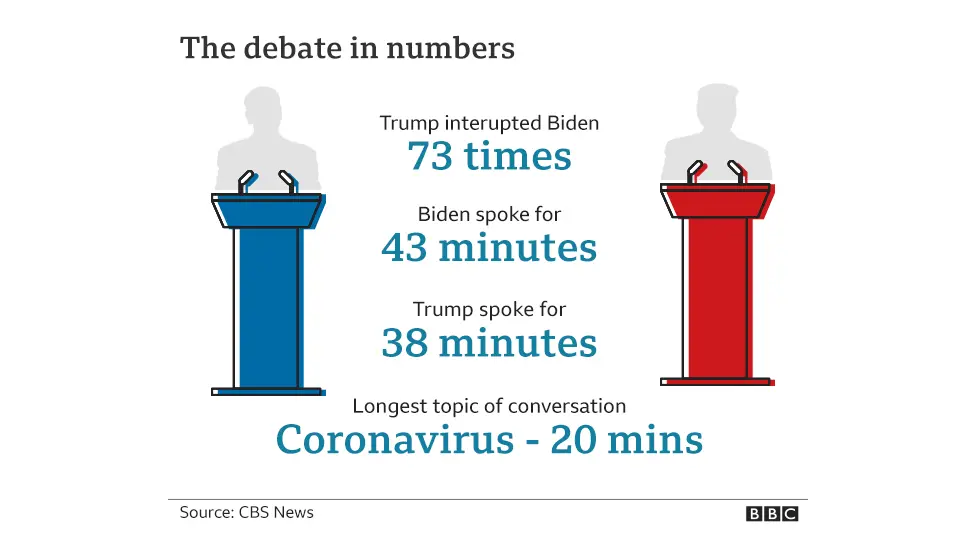Presidential debate: Rules to change after Trump-Biden spat
 Getty Images
Getty ImagesThe commission that oversees US presidential debates says it will change the format to ensure the remaining two encounters between Donald Trump and Joe Biden are more orderly.
One new measure could be to cut the microphones if the candidates try to interrupt each other, US media report.
The announcement follows Tuesday's ill-tempered debate that descended into squabbling, bickering and insults.
President Trump's team has already criticised the commission's plans.
The tone and tactics of the first presidential debate were criticised across the US and around the world.
The fallout, however, has also been dominated by Mr Trump's refusal in the debate to explicitly condemn a far-right group called the Proud Boys.
What are the plans for the next debates?
In Tuesday's debate, the candidates were given two minutes to answer moderator questions, before being allowed to address each other's response.
However, President Trump constantly interrupted Democratic candidate Joe Biden leading to a series of chaotic exchanges in which both men talked over each other.
The Commission on Presidential Debates (CPD) - a nonpartisan body that has organised presidential debates since 1988 - said it would soon announce new measures to help moderators "maintain order" in the remaining two debates.

It said the first debate had "made clear that additional structure should be added to the format of the remaining debates to ensure a more orderly discussion of the issues".
CBS News, citing an informed source, said the commission would spend the next 48 hours drawing up new guidelines and rules for the second debate on 15 October in Miami, Florida.
Controlling the candidates' microphones is at the top of the list, CBS said, in order to prevent them interrupting the moderator or each other.
Both campaign teams will be informed of the rules but they will not be subject to negotiation, the source added.
What's the reaction?
Trump campaign communications director Tim Murtaugh, who had described Tuesday's night's chaotic scenes as a "free exchange of ideas", criticised the plans.
"They are only doing this because their guy got pummelled last night," he said.
"President Trump was the dominant force and now Joe Biden is trying to work the refs. They shouldn't be moving the goalposts and changing the rules in the middle of the game."
Kate Bedingfield, deputy manager for Mr Biden's campaign, said the former vice-president would participate "under whatever set of rules the commission develops to try to contain Donald Trump's behaviour".
While one snap poll on the debate gave Mr Biden a slight edge, other opinion polls suggest 90% of Americans have already made up their mind how to vote for and the debate may well have made little difference.
In his first interview since the debate, moderator Chris Wallace told the New York Times it was "a terrible missed opportunity" and that he "never dreamed it would go off the tracks the way it did".
The Fox news anchor has come under criticism for struggling to control the debate. However, the CPD on Wednesday praised his "professionalism and skill".
What's the row about Proud Boys?
During the debate, Mr Wallace asked whether the president would condemn white supremacists and tell them to stand down during protests.
When Mr Trump asked who it was he was being told to condemn, Mr Biden twice said "Proud Boys", referring to a far-right, anti-immigrant, all-male group with a history of violence against left-wing opponents.
The president said: "Proud Boys - stand back and stand by. But I'll tell you what... somebody's got to do something about antifa [anti-fascist activists] and the left because this is not a right-wing problem."
Proud Boys members called his "stand by" remark "historic" and an endorsement.
Mr Biden said Mr Trump had "refused to disavow white supremacists".
On Wednesday Mr Trump appeared to try to walk back on his comments.
At a news conference on the White House lawn a reporter asked him about Proud Boys and he said: "I don't know who they are. I can only say they have to stand down and let law enforcement do their work."
He did not clarify his use of "stand by" in the debate. When asked whether he welcomed white supremacist support he said only that he wanted "law and order to be a very important part of our campaign".
Joe Biden returned to the issue in a tweet on Wednesday, saying: "There's no other way to put it: the President of the United States refused to disavow white supremacists on the debate stage last night."
In his tweet he quoted a comment, addressed to the president, from a Proud Boys online forum that read: "This makes me so happy. We're ready! Standing by sir."


When confronted with tough or tricky issues, Donald Trump has a tendency to offer a smorgasbord of often contradictory answers, allowing his supporters - and detractors - to pick and choose what to believe.
Nowhere has this behaviour been more pronounced than when he addresses white supremacists and extremist right-wing groups. At times he has renounced them. At others, he equivocates or changes the subject when a direct condemnation would suffice.
Instead, the president ends up offering a rallying cry to hate groups, as he did following the 2017 Charlottesville violence or with his "stand back and stand by" message on Tuesday.
The president can say all the right things politically, then turn around and say all the wrong things, leaving his aides to clean up the mess.
Is it because the president is careless with his words, misunderstood by critics and an adversarial press, or because he is sensitive to the concerns of even the more distasteful elements of his support base?
Despite all the talking and tweeting he does, the president - intentionally or not - remains a cypher.



Get in touch
If you thought the presidential debate was lacking in, well, actual debate - about plans and policies - then your prayers may be answered on Wednesday.
That's when Vice-President Mike Pence and Senator Kamala Harris go head-to-head on 7 October. We want to know - what questions do you have about the vice-presidential debate?
If you can't see the form, you may need to view the site on a desktop.
In some cases, your question will be published, displaying your name, age and location as you provide it, unless you state otherwise. Your contact details will never be published. Please ensure you have read our terms & conditions and privacy policy.
